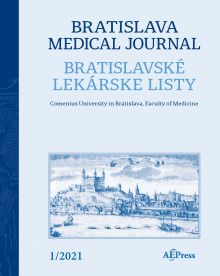Journal info
|
||||
Select Journal
Journals
Bratislava Medical Journal 2024 2023 2022 2021 2020 2019 2018 2017 2016 2015 2014 2013 2012 Ekologia - Ecology Endocrine Regulations General Physiology and Biophysics Neoplasma Acta Virologica Studia Psychologica Cardiology Letters Psychológia a patopsych. dieťaťa Kovove Materialy-Metallic Materials Slovenská hudba 2025Webshop Cart
Your Cart is currently empty.
Info: Your browser does not accept cookies. To put products into your cart and purchase them you need to enable cookies.
Bratislava Medical Journal Vol.125, No.10, p.589–596, 20242 |
||
| Title: Investigation of the relationship between anxiety-depression, systemic immune-inflammation index and clinical progression in COVID-19 | ||
| Author: Begum Aygen GUMUS, Ali Emre SEVIK, Sevil ALKAN | ||
| Abstract: OBJECTIVE: Given the multisystem nature of COVID-19 and its potential neuro-psychiatric effects along with the recognized role of systemic inflammation in the prognosis of both COVID-19 and psychiatric disorders, it is imperative to assess psychiatric symptoms in COVID-19 patients. This study sought to investigate the value of systemic immune-inflammation index (SII) scores, levels of anxiety and depressive symptoms assessed within the initial 24 hours following COVID-19 diagnosis as potential predictors of the clinical trajectory of COVID-19. METHODS: This study involved 64 patients admitted to our COVID-19 ward with mild-to-moderate COVID-19 pneumonia, all of whom underwent a psychiatric evaluation within 24 hours of admission. Upon admission, levels of c-reactive protein and inflammatory markers including leukocyte, neutrophil, thrombocyte, and lymphocyte counts were measured to calculate individual SII scores. Psychiatric evaluations were conducted using the State-Trait Anxiety Inventory (STAI), Hamilton Depression Rating Scale (HDRS), and Standardized Mini-Mental Test (SMMT). RESULTS: The patients with clinical deterioration of COVID-19 exhibited higher STAI-Trait and STAI-State subscale scores measured upon admission compared to those without clinical deterioration. HDRS scores showed no significant correlation with clinical deterioration. STAI-State subscale scores correlated with SII scores and the duration of hospital stay. High baseline STAI scores and SII scores predicted COVID-19 clinical deterioration. CONCLUSION: Our study demonstrated that the initial SII and STAI scores assessed within the initial 24 hours of hospitalization for COVID-19 significantly predicted the clinical progression of the disease during the hospital stay (Tab. 5, Ref. 37). Text in PDF www.elis.sk |
||
| Keywords: COVID-19, systemic inflammatory response index, disease severity, inflammation | ||
| Published online: 26-Aug-2024 | ||
| Year: 2024, Volume: 125, Issue: 10 | Page From: 589, Page To: 596 | |
| doi:10.4149/BLL_2024_92 |
||
|
|
 download file download file |
|

